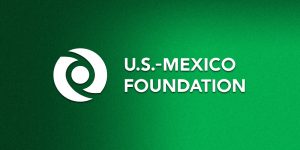 By Javier Brown César *
By Javier Brown César *
The Rio Bravo Congressional Fellowship is a clear example that when two important institutions collaborate closely, great results can be achieved. The Fellowship, launched in partnership between the Atlantic Council and the U.S.-Mexico Foundation, brings together congressional staffers from the U.S. and Mexico with leading experts to discuss key issues for the bilateral relationship.
Thanks to the Fellowship, I was able to live a unique experience in 2020 that took me to the heart of the U.S.: Washington D.C., the nerve center of the world’s greatest power. The city not only revolves around the U.S. government but also around international institutions such as International Monetary Fund, the World Bank and the Organization of American States.
For a staffer working in Mexico’s Upper Chamber like me, the program’s phase in Washington was very rich. Yet, the program goes even further through online classes. One would expect that the Fellowship’s syllabus would be centered around governmental actors. Yet, the agenda also included a wide range of meetings including with members of the private sector. The program provides participants with a vision of the relationship beyond immediate political concerns. It allows Fellows to participate in discussions about the future being built in America. Without a doubt, the meetings achieved their main objective: the group of Mexican staffers were different people when they left. The Fellowship had certainly changed our perspectives and ideas of how politics and business are conducted in the U.S.
The Fellowship highlights simple things that define a part of U.S. professional life: punctuality, freedom, responsibility, order and cleanliness. All the events I participated in were carefully organized and I can say that every meeting was fertile ground for the exchange of ideas and camaraderie. While in Washington, the Fellows enjoyed memorable moments including a meeting hosted in an old colonial house near the Capitol and a very Mexican Cinco de Mayo celebration.
The Washington phase of the program was varied and very seriously thought out. We had the opportunity to visit Georgetown University and the Americas Institute which is led by renowned economist Alejandro Werner. We had a virtual meeting with Rep. Tony Gonzáles (R-TX) and held a virtual meeting with high-level officials from the U.S. Department of State. Other important sessions included visits to insurance giant MetLife, the Baker McKenzie law firm, retail multinational Walmart, cloud platform provider Amazon Web Services and technology giant Apple. At the Atlantic Council, we we had a productive meeting on the role of think tanks and had a session at the International Republican Institute (IRI). At the Organization of American States (OAS) we personally met the organization’s Secretary for Strengthening Democracy, Francisco Guerrero. We also met with Sergio Gómez Lora, who runs the D.C. office of the Mexico’s Coordinating Council (CCE). Each of these meetings had its own rhythm and charm.
While in Washington, we even had time to visit the impressive Smithsonian Museum of American History. Yes, it is true that the agenda was tight, but not so tight that we missed the opportunity to visit the city’s great monuments and buildings modeled after those in ancient Rome. This was important to understand a nation built with a spirit of greatness.
Each meeting had its own dynamics. In each one of them, we had the opportunity to put aside our daily work schedules and we got to learn about the steps the U.S. was taking as it emerged from the 2020 Covid-19 lockdown.
During the trip we were able to meet personally with the dedicated and professional team that makes the Fellowship possible: María Fernanda Bozmoski and Jason Marczak from the Atlantic Council along with and Nuria Palou and Enrique Perret from the U.S.-Mexico Foundation. They all have become our friends.
For those Mexican Congressional staffers, the program opened us a path to continue working in deepening the most important bilateral relationship that Mexico has in the world. Mexico and the U.S. are united by historical and family ties: 38 million people of Mexican-origin living in the U.S. and 1 million U.S. citizens living in Mexico. Yet, this is just one of the many statistics that define the nature of U.S.-Mexico relations which include one of the largest trade interactions in the world, the busiest international land border and deep cultural interactions.
Through the Río Bravo Fellowship we formed friendships. We also establish closer ties with some key U.S. decision makers. Everyday we benefit from the links we forged during our trip to Washington. Personally, I will always remember this experience which changed my life and my professional horizons. Those of us who took part in the Fellowship must recognize all that we have won and all that we learned. I will always carry with me the memories of those pleasant days in Washington when I got to know the heart of the U.S. ¡Gracias!
* Javier Brown César is chief of staff at the Mexican Senate’s Committee for North American Affairs. He was formerly chief of staff at Mexico’s Ministry of the Interior and at the Mexican Chamber of Deputies. The U.S.-Mexico Foundation is a binational non-profit organization dedicated to fostering bilateral cooperation and improving the understanding between the United States and Mexico by activating key people in the relationship that once were dormant. Twitter: @usmexicofound


